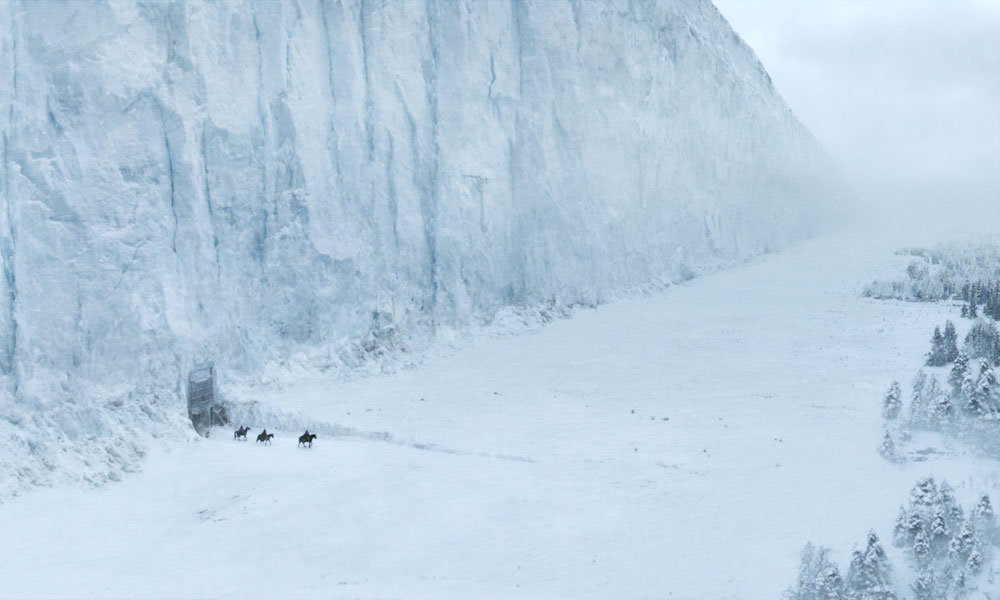Is the Ice Wall from 'Game of Thrones' Physically Possible?

NEW ORLEANS—In the HBO TV series "Game of Thrones," a great wall of ice helps repel giants and the undead. But could such a structure be possible here on Earth? A new study suggests that, no, it's not realistic, because without magic, such a barrier would fall rapidly.
The gigantic icy barrier simply known as "the Wall" in "Game of Thrones" is about 700 feet (215 meters) high, 300 miles (480 kilometers) long and wide enough at its top for a dozen mounted knights to ride side by side. One of the nine wonders made by humans in George R.R. Martin's "A Song of Ice and Fire" (from which "Game of Thrones" is adapted), the Wall was built by the legendary figure known as Brandon the Builder, with the aid of giants.
The aim of the Wall is to defend the northern border of the Seven Kingdoms. To protect the Wall against invaders, the military order known as the Night's Watch possesses 19 forts, such as the Shadow Tower and Castle Black. [Photos: 33 Stunning Locations Where 'Game of Thrones' Was Filmed]
But how strong would such a great ice wall actually be? The problem with ice is that it can flow, said study author Martin Truffer, a glaciologist at the University of Alaska Fairbanks.
Truffer calculated that the weight of an ice wall about 655 feet (200 m) high would generate nearly 1.8 megapascals (261 pounds per square inch) of stress at its base. In comparison, the amount of stress it typically takes for ice to flow in glaciers is just 0.1 megapascals (14.5 psi) or so, Truffer said.
"I just ran through some really simple equations to determine how that wall would deform under its own weight," Truffer told Live Science.
Although he noted that this work was meant only as a fun exercise, it could have practical uses as well. "These same equations also have more serious applications in examining the behavior of polar ice caps on Mars," Truffer said.
Sign up for the Live Science daily newsletter now
Get the world’s most fascinating discoveries delivered straight to your inbox.
The rate at which the Wall would deform would depend significantly on the average annual temperature of the air around it. "Because there are forests around the Wall, it can't be that cold — say, minus 10 degrees Celsius [14 degrees Fahrenheit]," Truffer said. "At that temperature, the wall would quickly slump within a few months, or maybe even a few days."
One way to keep the Wall stable might be to cool it significantly. For instance, chilling the Wall to minus 40 degrees F (minus 40 degrees C) would reduce the amount of strain it experienced by about a hundredfold, Truffer said.
"There a few places on Earth that cold — some in Antarctica," Truffer said.
However, even if chilled to minus 40 degrees F, the Wall would still slump significantly over several years, Truffer said.
"The books say the Wall is about 8,000 years old, and after 1,000 years, it would be pretty flat," Truffer said. "That defeats the whole purpose of the Wall."
"I conclude that the ice wall as proposed would not be a practicable defense under typical Earth conditions," Truffer stated in the findings, detailed Dec. 11 at the annual meeting of the American Geophysical Union in New Orleans. "Special magical powers would be necessary to maintain its shape, even for just a few days."
Perhaps that's the true secret of the wall's defense.
Indeed, ancient spells are supposedly woven into the Wall, according to Samwell Tarly, a sworn brother of the Night's Watch, in Martin's book "A Storm of Swords." Incidentally, this sorcery may also ordinarily prevent the undead from crossing the Wall, Tarly says in the book.
Original article on Live Science.











